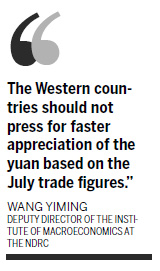Dalian, Liaoning - The 18-month high trade surplus in July is a "unique" case and should not be used as an excuse to press China to revalue its currency, a senior government economist said on Sunday in Dalian, Liaoning province.

"The trade surplus will narrow, as exports are expected to slow down for the rest of the year," Wang Yiming, deputy director of the Institute of Macroeconomics at the National Development and Reform Commission, told China Daily on the sidelines of an economic seminar.
"The Western countries should not press for faster appreciation of the yuan based on the July trade figures," he said.
Customs statistics show China's trade surplus surged to $28.7 billion in July from $20 billion in June, the highest level since January 2009. But the total trade surplus of the first six months was down 42.5 percent year on year to $55.3 billion.
The yuan's exchange rate is not a determinant cause for trade imbalances, he said. "The surplus comes, to a large extent, from our advantage of having lower costs on human resources, land, tax and the environment," he said, adding that if the advantage of lower costs disappears, the trade surplus will narrow.
China should not give in to foreign pressure on currency appreciation, Wang stressed. The yuan had its biggest weekly decline in 20 months on speculation over a slowdown in growth for the world's third largest economy.
The People's Bank of China set the rate of exchange on Friday at 6.8035 yuan to the dollar, 0.27 percent lower than the previous day's close of 6.7851.
According to Wang, the upsurge in July may not be repeated in the coming months. It was caused by "particular" factors, he said.
The reduction of imports was due to a moderate slowdown in domestic economic growth, while the increase in exports was the result of some exporters trying to move more of their products before export tax rebates were withdrawn on 406 kinds of goods, starting on July 15.
Wang made his comments at a seminar hosted by the China Center for International Economic Exchanges and the Dalian municipal government, to provide a platform for economists to discuss how to restructure the Chinese economy to make it more sustainable.
By Zhang Xiaomin
Editor: Li Cheng